Successful affiliate marketing requires good keyword research. There are many keyword research tools out there and my go-to is SEMrush. The best way to learn about how to do keyword research with SEMrush is to look at an example in use.
Since the How to Start an Online Business Series has been about starting a blog for affiliate marketing, that’ll be our example here.
I cover more details on affiliate marketing in another blog post, but here’s a quick summary, so you don’t need to leave the page.
What is Affiliate Marketing and How Does It Work?
When it comes to earning money online, affiliate marketing is gaining wide popularity. Affiliate marketing can be a good source of passive income if done right.
The simplest way to think of affiliate marketing is as referrals. Affiliates refer people to buy a particular product online through a unique link, so that brands know who referred the customer. The affiliates then get paid a commission for the sale.
Affiliates can write buying guides and product reviews. While discussing products, they’ll put their unique affiliate links for readers to click on in case readers are interested in buying the products.
Using Amazon Associates as an example of a brand and myself as an affiliate, affiliate marketing works in 3 simple steps:
- I sign onto Amazon’s affiliate program website and create a unique URL link for a product. For this example, I’ll pick their popular Echo Dot, because it’s popular and I think people will buy it.
- I write a product review or buying guide for the Echo Dot. Somewhere in the article when discussing where the reader can buy the Echo Dot, I’ll place a text link or a banner ad, like this one:
- I sign onto Amazon’s affiliate program website and create a unique URL link for a product. For this example, I’ll pick their popular Echo Dot, because it’s popular and I think people will buy it.
- I write a product review or buying guide for the Echo Dot. Somewhere in the article when discussing where the reader can buy the Echo Dot, I’ll place a text link or a banner ad, like this one:
- A reader clicks the banner ad to be taken to Amazon’s Echo Dot page. If the reader purchases the Echo Dot from that link, a commission is credited to my affiliate account. I’ll be paid by Amazon when I reach a certain amount of commissions.
That’s affiliate marketing in a nutshell.
But first, you’ll need to setup a blog and have a place to promote affiliate links. That’s where the blog post of how to setup a blog from the How to Start an Online Business series will help.
How Does SEMrush Help Affiliate Marketers?
There are thousands of registered affiliate marketers, but are all of them successful? No. This is because the strategies, processes, platforms, and especially the content used by all of them vary.
With the increasing popularity of digital marketing strategies, the phrase “Content is the king” is gaining more and more popularity. SEO, which was once considered a way to easy success, is now being used by everyone, thereby increasing the competition. Google also updates its search algorithms regularly, making quality content a higher priority. This is why I have a blog post on how to create SEO rich content to help drive traffic to your site.
Keywords are a big part of good SEO. You want to use the right keywords that your target audiences are searching for, otherwise you won’t be able to drive any traffic to your blog. Good placement of the keyword is also equally important.
SEMrush is an SEO tool platform that helps affiliate marketers and other blog owners increase their visibility by providing them with all the helpful keyword research and digital marketing tools under one roof. Whether it’s for SEO, paid traffic, social media marketing, content, PR, and market research, SEMrush probably has a feature for your needs. I do have a review post of how SEMrush helps to increase your profits that you can read to get more insight into what tools they have to help you increase your profits.
Affiliate marketing is all about visibility and influence. The more visible the blog is, the better are the chances that a user will click the link to your site from Google. Then it’s your content’s job to influence the reader to click on a link to buy. After the reader buys, you’ll then get paid a commission.
First things first, let’s talk about keyword research.
What is Keyword Research?
Keyword research is the simple process of finding keywords or phrases, which users will input into search engines while finding their relevant Content.
Keywords can be researched using popular online platforms like Google Trends, then used in blogs to increase online visibility and rank in the search results. Here’s an example of Google Trends for the keyword “affiliate marketing”:
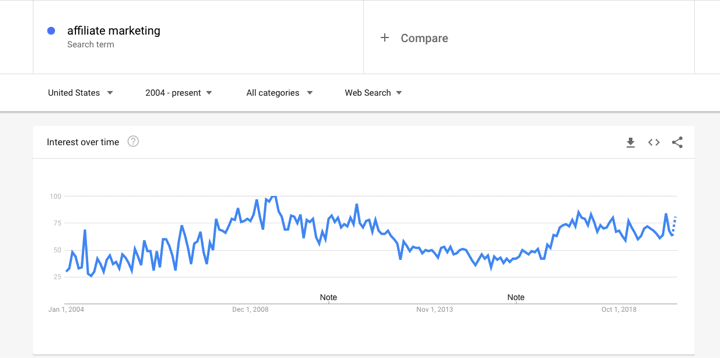
Since 2004, that’s the trend for the keyword. That gives us the popularity of affiliate marketing and how many people have been searching Google for that keyword. You can use it to find the popularity of products, find new trends, etc.
While Google Trends gives you a good idea of the general trend, it’ll be hard to rank high in search results for the keyword “affiliate marketing.” What you want to do then, is to find less popular keywords, “long tail keywords,” that you can use in your blog articles to rank higher for.
Long tail keywords are specific keywords that have less search volume overall, but easier to rank for in search engine results pages (SERP). Ranking higher in SERP gives your article and site more visibility to users, so you have a higher chance for someone to see your link and click on it.
This is where SEMrush and other SEO keyword research tools can help dig deeper to find good long tail keywords.
How SEMrush Tools Help With Keyword Research
For keyword research, SEMrush’s keyword analytic tools offer a wealth of information. Let’s go through some of what I use regularly to give me ideas of what to write about and how to write.
If you want to follow along and don’t have a SEMrush account yet, you can sign up for a Free 7-day Trial through my affiliate link.
Keyword Overview
After entering your keyword to search for, affiliate marketing here, the Keyword Overview page will give you just that, an overview of your keywords.
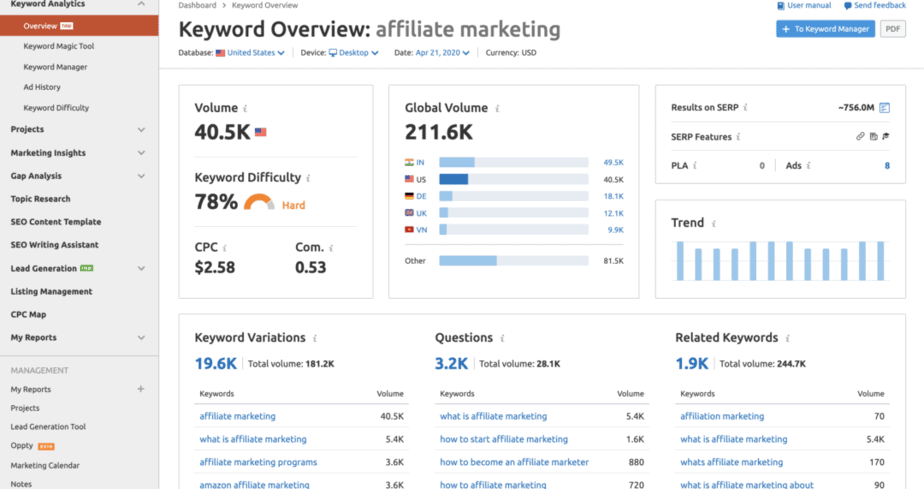
You get a detailed report about the keywords you searched for. From here, you can see all these metrics to analyze like search volume, keyword difficulty, costs per click (CPC), competition, volume, top-ranking pages, and many more.
The key metrics to make note of:
Volume
How often “affiliate marketing” is searched for monthly in the United States. You can change the country, but the US will have higher CPC, so that should usually be your main target for an English site.
Keyword Difficulty
How hard “affiliate marketing” will be to rank for in SERP, due to competition. This is why we want to go after long tail keywords, which have lower keyword difficulty.
CPC, Cost-per-click
How much is paid when users click on ads for the keyword “affiliate marketing.” This is a metric you want to keep an eye on if you place ads on your blog site. CPC will let you know that there are advertisers out there who are willing to pay to place ads on your site for that keyword. That tells you at least that the keyword’s topic is popular enough that a good number of people are searching for that area. But that won’t give a good indication of how much you’ll make in affiliate sales, because the user needs to make a purchase still. Long tail keywords usually have $0.00 CPC, because there’s not enough search volume.
Keyword Variations / Questions / Related Keywords
These three sections are where we’ll start getting into the search for long tail keywords.
Notice in Related Keywords, there’re lower search volumes for the keywords:
- affiliation marketing – 70
- what is affiliate marketing – 170
- what is affiliate marketing about – 90
Those would be considered long tail keywords because each has a low monthly search volume. Because the search volume is lower for each of those keywords, that means the bigger sites will not focus on those. The bigger sites have higher domain authority due to their large daily traffic, so they’re going to focus on the main keywords like “affiliate marketing” that has 40,500 searches per month.
For smaller sites, the strategy then is to have enough of those long tail keywords on your site that you are ranking for those keywords. Individually, the keywords don’t drive much traffic. But together, 330 people are searching for those keywords monthly. Those 330 people will then see your site in the search results when they search “affiliation marketing, what is affiliate marketing, and what is affiliate marketing about.”
Keyword Magic Tool
The Keyword Magic tool is the most used tool for me. This powerful tool helps to generate a master list of keywords to look into more. All you need to do is type your keyword and then hit the Search button.
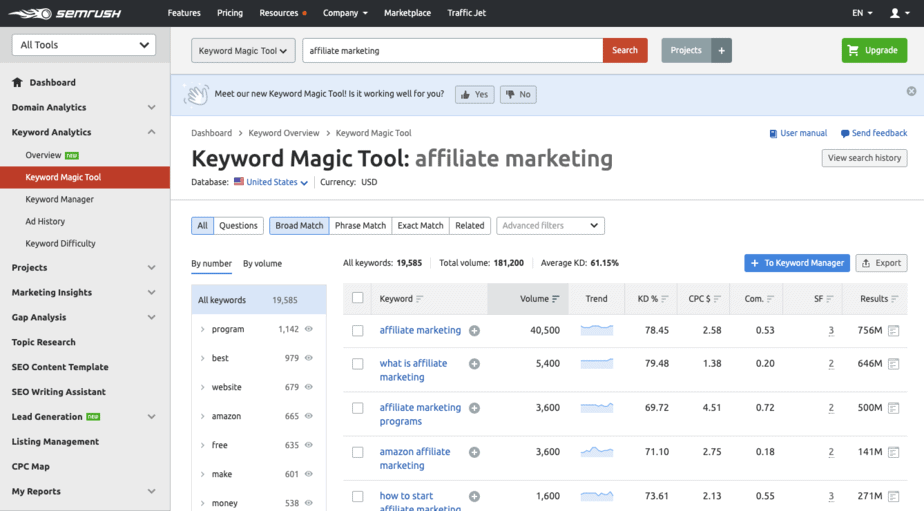
You will be provided with a list of keywords divided into several subgroups. There are various sort and filter options also available for your ease. You can sort the keywords based on the volume, keyword difficulty percentage, CPC, competitive density, SERP features, number of results when searched, etc. There are several other features like the Question filter, which filters all the keywords to display the ones in the form of questions. These are helpful as users will often search using questions.
There are also advanced filters like difficulty level, competitive advantage, number of results in SERP, etc., which can be used by the marketers while finding the ideal keyword for their blogs. Using these filters, you can easily check how your keyword will perform and which keywords you need to emphasize. It is important to check for the competitors’ keywords as these will help you design your strategy better.
Using these filters will help to get to those long tail keywords that you’ll want to focus on when starting. That’ll give you the best chances of getting up and noticed by people searching the internet.
Ad History Tool
A quick aside, the ad history tool helps the marketers shows a history of ads with the keywords you’re looking at. Understand how frequently the keyword has been used in the paid promotional ads and also check the traffic that the particular ads drove. You can also find the total number of ads for your keywords, as well as the ad traffic prices that were paid.
Keyword Gap Tool
With the keyword gap tool, you can easily look at how your site has performed compared to your competitors. Find what potential keyword opportunities you need to explore further. All you need to do is type in your website URL and a competitor’s, up to four competitors.
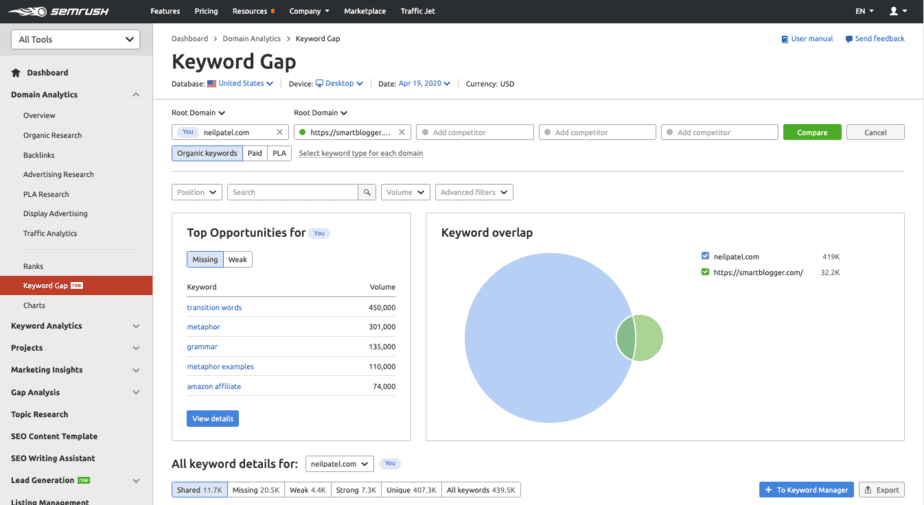
Here, I did a couple of the top sites that rank for “affiliate marketing” in neilpatel.com and smartblogger.com.
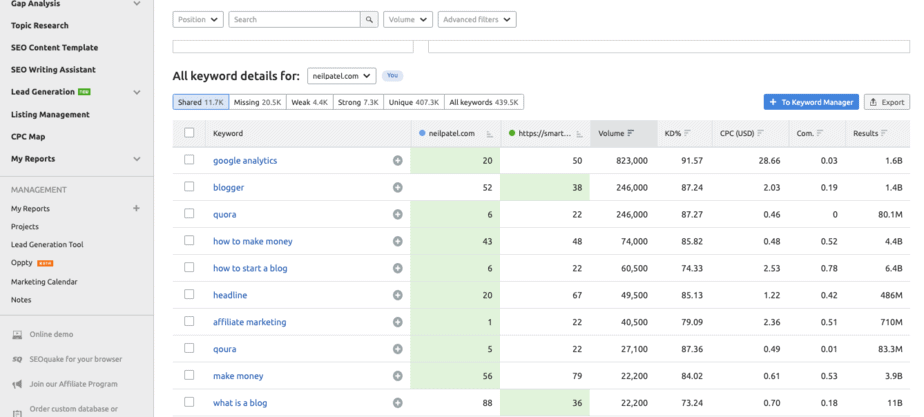
You’ll be able to analyze performance for specific keywords that both domains rank for. See which ones you’re above in, but also which ones you might be able to overtake by optimizing your site for those specific keywords. With the help of this tool, you can easily find your flaws and where you need to improve if you want. Several advanced search filters can be used to make your analysis better.
Your Domain’s Current Keywords
Apart from doing the keyword research, SEMrush also has domain tools to show your domain’s current keyword positions and keyword performances.
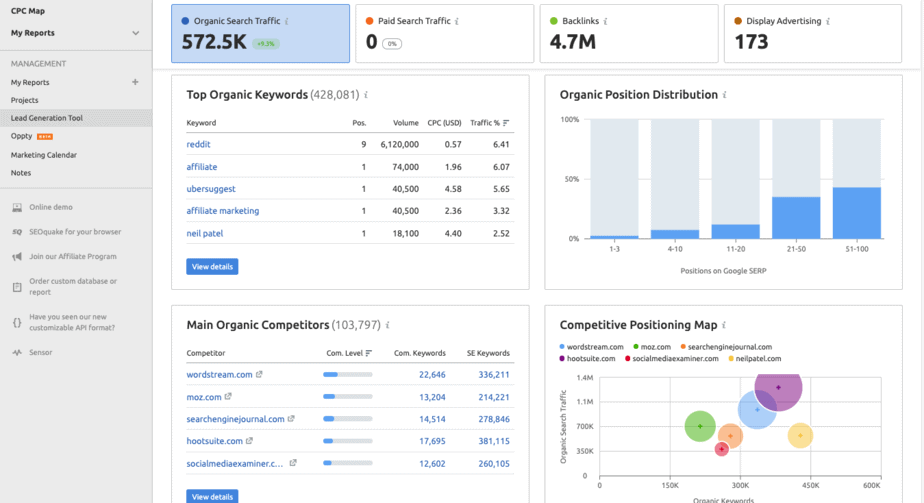
After you have chosen the best keywords for your blog, it is important to monitor the results. Just sprinkling your blog with the necessary keywords doesn’t help. Using the Position tracking tool in SEMrush, you can easily get daily reports and rankings of your keywords.
Even if your top organic keywords are strong, make them stronger on your site. If you’re already number 1 for a keyword, don’t relax, because I’m sure number 2 is hungry and wants to be number 1. The good thing is you’ll know who your main organic competitors are, as well as your competitive positioning. You’ll want to also check out your competitors to see what they’re doing well and not.
Conclusion
For me, SEMrush has everything I need for keyword research and analysis. Using the analytical and search tools, you’ll have the data to figure out how to increase traffic to your blog in Google or Bing search results.
While finding the right keywords can be a long, tough, and manual task, the rewards of more traffic are so motivational. The more traffic you get, the more passive income you’ll be generating. And don’t forget to continue monitoring the performance of keywords and competitors to continue growing.
SEMrush has a FREE online keyword research course if you want to continue learning from their digital marketing expert, Greg Gifford.
If you want to get started with a 7-day Free Trial, head over to SEMrush’s site and sign up now.
Recap of the key SEMrush keyword research tools I use:
Best SEMrush Features and Tools to Help with SEO Keyword Research
These are my most used SEMrush tools when doing keyword research for my affiliate marketing blogs. There are many tools out there from others, but these are the ones I use the most.
1. Keyword Overview
2. Keyword Magic Tool
3. Ad History Tool
4. Keyword Gap Tool
5. Domain Overview
6. Competitive Research Tools
7. Domain and Keyword Position Tracking
